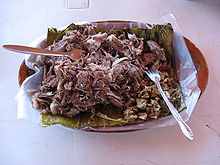
Barbacoa or Asado en Barbacoa (Spanish: [baɾβaˈkoa] ) in Mexico, refers to the local indigenous variation of the method of cooking in a pit or earth oven.[1] It generally refers to slow-cooking meats or whole sheep, whole cows, whole beef heads, or whole goats in a hole dug in the ground,[2] and covered with agave (maguey) leaves, although the interpretation is loose, and in the present day (and in some cases) may refer to meat steamed until tender. This meat is known for its high fat content and strong flavor, often accompanied with onions and cilantro (coriander leaf). Because this method of cooking was used throughout different regions by different ethnic groups or tribes in Mexico, each had their own name for it; for the Nahuatl it was called nakakoyonki;[3] for the Mayan it was called píib; for the Otomi it was called thumngö.[4]
Similar methods exist throughout Latin America and the rest of the world,[5] under distinct names, including: pachamanca and huatia in the Andean region; curanto in Chile and southern Argentina; berarubu[6][7] in Brazil; cocido enterrado[8] in Colombia; or hāngī in New Zealand.
Although it is speculated that the word ”barbacoa” may have originated from the Taíno language, this method of cooking in an earth oven has nothing to do with the original Taíno definition of the word.[9]
- ^ Espinosa, Isidro Félix de (1746). Chronica Apostólica y Seraphica de todos los Colegios de Propaganda Fide de esta Nueva-España de Missioneros Franciscanos Observantes. Mexico: Viuda de D. Joseph Bernardo de Hogal. p. 470. Retrieved 5 May 2024.
- ^ García Icazbalceta, Joaquín (1899). Vocabulario de Mexicanismos. Mexico: La Europea. p. 43. Retrieved 14 May 2024.
- ^ "Comida en el idioma Náhuatl". Nahuatl. 7 June 2017. Retrieved 8 May 2024.
- ^ "Como se dice la comida en Otomí". Otomí. 13 May 2016. Retrieved 8 May 2024.
- ^ Miglio, Paola (24 August 2022). "Así se cuecen los alimentos bajo tierra en Latinoamérica". Revista Diners. Archived from the original on 5 September 2023. Retrieved 5 May 2024.
- ^ "Berarubu". Etnolinguistica. Biblioteca Digital Curt Nimuendaju. Retrieved 5 May 2024.
- ^ "'Festa do Berarubu' relembra tradição da culinária indígena no Tocantins". G1. Globo. 21 July 2014. Archived from the original on 29 April 2019. Retrieved 5 May 2024.
- ^ "COCIDO ENTERRADO". El Toque Colombiano. 8 June 2019. Archived from the original on 7 December 2023. Retrieved 5 May 2024.
- ^ Pineda, Pedro (1740). New Dictionary, Spanish and English and English and Spanish. London: F. Gyles. Retrieved 5 May 2024.